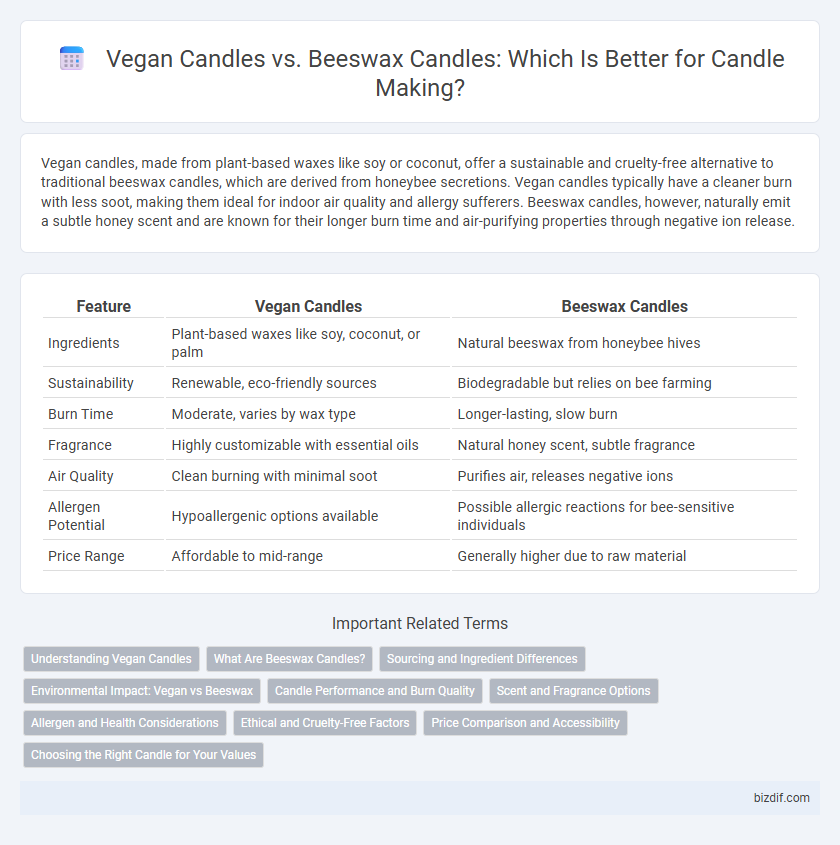Vegan candles, made from plant-based waxes like soy or coconut, offer a sustainable and cruelty-free alternative to traditional beeswax candles, which are derived from honeybee secretions. Vegan candles typically have a cleaner burn with less soot, making them ideal for indoor air quality and allergy sufferers. Beeswax candles, however, naturally emit a subtle honey scent and are known for their longer burn time and air-purifying properties through negative ion release.
Table of Comparison
| Feature | Vegan Candles | Beeswax Candles |
|---|---|---|
| Ingredients | Plant-based waxes like soy, coconut, or palm | Natural beeswax from honeybee hives |
| Sustainability | Renewable, eco-friendly sources | Biodegradable but relies on bee farming |
| Burn Time | Moderate, varies by wax type | Longer-lasting, slow burn |
| Fragrance | Highly customizable with essential oils | Natural honey scent, subtle fragrance |
| Air Quality | Clean burning with minimal soot | Purifies air, releases negative ions |
| Allergen Potential | Hypoallergenic options available | Possible allergic reactions for bee-sensitive individuals |
| Price Range | Affordable to mid-range | Generally higher due to raw material |
Understanding Vegan Candles
Vegan candles are made from plant-based waxes such as soy, coconut, or palm, offering a sustainable and cruelty-free alternative to traditional beeswax candles. These candles burn cleaner with minimal soot and toxins, making them ideal for improving indoor air quality and reducing environmental impact. Understanding vegan candles involves recognizing their ethical production, renewable ingredients, and compatibility with essential oils for natural fragrance.
What Are Beeswax Candles?
Beeswax candles are made from natural wax produced by honeybees, known for their clean-burning properties and subtle honey scent. These candles release negative ions when burned, which can help purify indoor air by neutralizing pollutants and allergens. Unlike vegan candles made from plant-based waxes such as soy or coconut, beeswax candles are prized for their long burn time and traditional, natural origins.
Sourcing and Ingredient Differences
Vegan candles primarily use plant-based waxes such as soy, coconut, or palm, sourced from renewable agricultural crops, while beeswax candles derive from natural bee secretions harvested from beehives. Vegan waxes often involve sustainable farming practices and avoid animal exploitation, making them ideal for eco-conscious consumers. Beeswax, though natural and biodegradable, depends on ethical beekeeping practices to ensure minimal disruption to bee populations and ecosystems.
Environmental Impact: Vegan vs Beeswax
Vegan candles, typically made from soy, coconut, or other plant-based waxes, offer a renewable and sustainable alternative with a lower carbon footprint compared to beeswax candles. Beeswax candles, while natural and biodegradable, rely on bees whose populations are threatened by habitat loss and environmental changes, potentially impacting ecosystem balance. Choosing vegan candles supports reduced strain on bee populations and promotes the use of renewable plant resources, minimizing environmental impact.
Candle Performance and Burn Quality
Vegan candles, typically made from soy, coconut, or palm wax, offer a clean and slow burn with minimal soot, enhancing indoor air quality and extending burn time. Beeswax candles naturally emit a subtle honey aroma while providing a bright, steady flame and excellent drip resistance, resulting in a longer overall burn compared to many plant-based alternatives. Both types excel in different performance metrics, with vegan candles favored for a neutral scent and eco-friendliness, whereas beeswax candles are prized for durability and natural antimicrobial properties.
Scent and Fragrance Options
Vegan candles, typically made from soy, coconut, or other plant-based waxes, offer a wider variety of scent and fragrance options due to their excellent scent throw and ability to blend well with essential oils and synthetic fragrances. Beeswax candles have a natural, subtle honey aroma that can enhance the fragrance experience but often limit the variety and intensity of added scents. Choosing between the two depends on whether you prioritize a natural honey scent with limited fragrance diversity or a broader range of tailored aromas with a clean, plant-based base.
Allergen and Health Considerations
Vegan candles, made from soy, coconut, or other plant-based waxes, minimize allergen risks by avoiding animal-derived ingredients, making them suitable for sensitive individuals. Beeswax candles emit natural, hypoallergenic scents and can improve indoor air quality by releasing negative ions, but may cause reactions in people allergic to bee products. Choosing the right candle involves assessing personal sensitivities to allergens and potential respiratory effects from soot or additives.
Ethical and Cruelty-Free Factors
Vegan candles use plant-based waxes such as soy, coconut, or palm, ensuring a cruelty-free and sustainable production process, which appeals strongly to ethical consumers seeking animal-friendly alternatives. Beeswax candles involve animal-derived ingredients, raising concerns about bee welfare and environmental impacts within beekeeping practices. Choosing vegan candles supports a more ethical and eco-friendly approach, aligning with cruelty-free lifestyles and reducing harm to pollinators.
Price Comparison and Accessibility
Vegan candles, typically made from soy, coconut, or palm wax, are generally more affordable and widely accessible due to the use of abundant plant-based materials and large-scale production. Beeswax candles, derived from natural bee byproducts, tend to be pricier because of the labor-intensive harvesting process and limited supply. Availability of vegan candles is higher in mainstream markets and online stores, while beeswax candles are often found in specialty shops or local artisan markets.
Choosing the Right Candle for Your Values
Vegan candles made from plant-based waxes like soy, coconut, or palm offer an eco-friendly, cruelty-free alternative to traditional beeswax candles, aligning with values of sustainability and animal welfare. Beeswax candles naturally purify air by emitting negative ions, making them ideal for those prioritizing indoor air quality and natural ingredients. Selecting the right candle depends on balancing ethical considerations, environmental impact, and desired benefits such as fragrance longevity and burn time.
Vegan candles vs Beeswax candles Infographic

 bizdif.com
bizdif.com